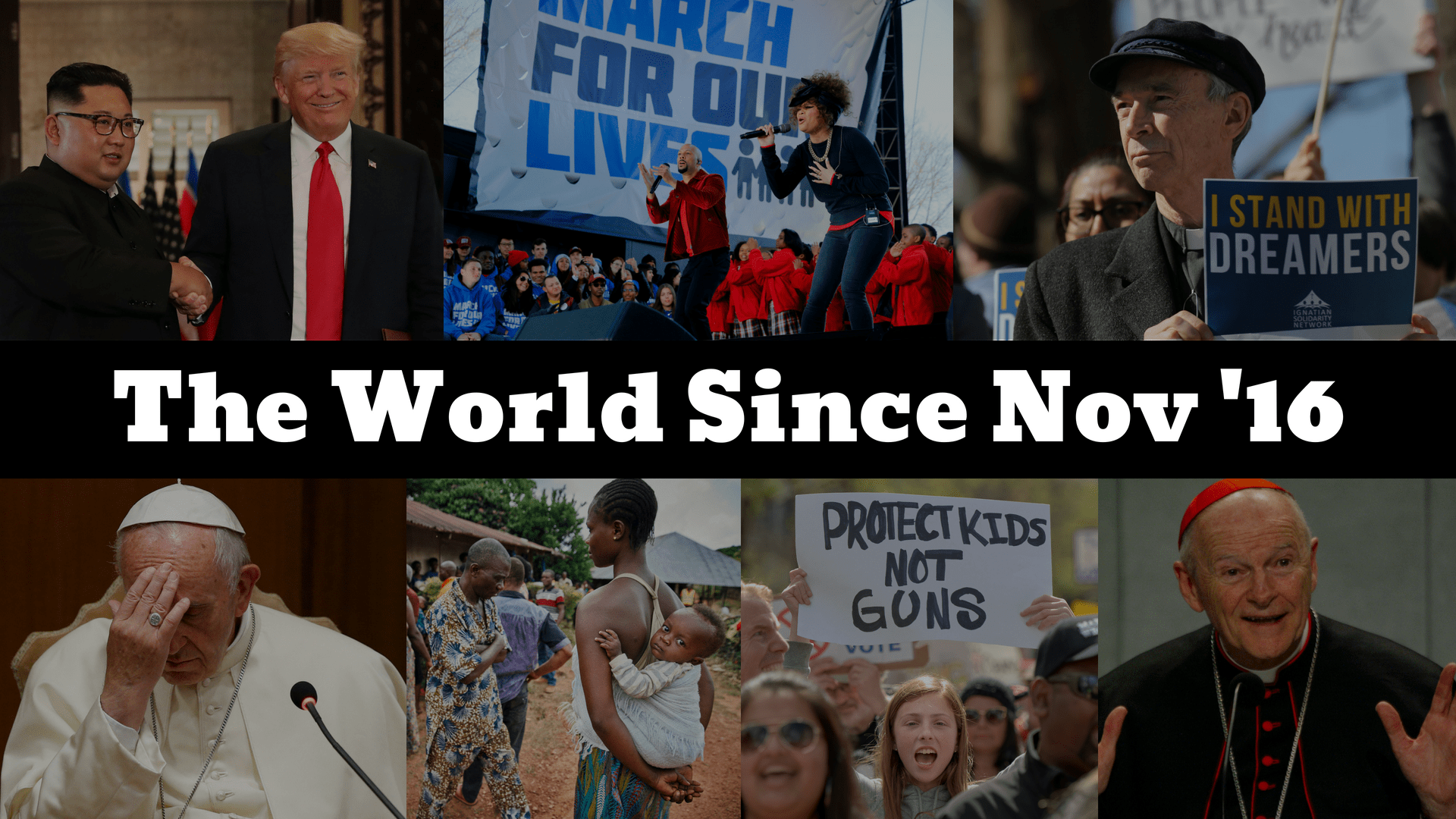“Events, dear boy, events.”
In a contest for weariest political cliches, Harold MacMillan’s oft-quoted if unverified remark about the perilous threat of new and unexpected developments to political programs and campaigns would rate well. Yet, as the November 2018 midterm elections approach, it is worth considering if it is still true. The sheer volume of events since November 2016 has made it difficult to remember, let alone properly discern and judge the things that have mattered most.
With that in mind, let’s look at the events of the past several months. Much of it will be familiar, but I suspect many of the specific events, persons, and reactions will have receded from your active memory.
Migrants and Refugee Crisis
Since November 2016, the international refugee crisis has deepened. According to the United Nations, roughly 68 million persons are displaced from their homes, primarily as a result of war, conflict, and violence on several continents. Wars in Syria, Yemen, and the Democratic Republic of the Congo; ethnic cleansing of minority Rohingyas in Myanmar; gang violence in Central America; and terrorism in many parts of Africa have created conditions that forced millions to flee. While most refugees are internally displaced or have been relocated to neighboring countries (Rohingya in Thailand), others have migrated across great distances seeking security. The United States has not remained untouched by this crisis, with the government acting to deny visas and asylum to migrants from certain countries; the government’s policy on family separation prompted a major political crisis and harsh criticism.
Pope Francis has made advocacy for migrants and refugees a central issue for his pontificate. His first papal trip out of Rome was to Lampedusa, a destination for many refugees and to where many refugees who died at sea were seeking to reach. Pope Francis has consistently challenged indifference to migrants and refugees among world leaders and in more affluent nations.
Mass Opioid Addiction and Overdoses
More people than ever are dying due to drug overdoses in the U.S. In 2017, 72,000 Americans died due to drug overdoses, an increase from 2016 and a continuation of an upward trend for much of the past decade. Accelerated by increased prescription of opioids by doctors for chronic pain that left many patients addicted to opioids as well as the increasing availability of heroin, abuse of opioid-based drugs has ravaged most parts of the country, especially New England, Appalachia, and the Upper Midwest. While both parties have expressed concern and a desire to tackle the problem, the sheer complexity has made advancing any major legislation or policy difficult.
Healthcare Repeal Fails, Tax Reform Doesn’t
Despite the relative inactivity of Congress outside of the confirmation of judicial appointments, in 2017, Congress attempted two major legislative initiatives. The first, a series of health care bills that aimed at radical changes to previous health care legislation, failed as the House of Representatives and the Senate could not come to consensus on any single bill. In contrast, the GOP-driven tax reform bill passed both houses of Congress and was signed into law by the president.
Summits, Tariffs, and Trade Wars
While much of the focus in American politics has been internal for the past few years, the world stage has not been quiet. The United States moved its embassy in Israel from Tel Aviv to Jerusalem and withdrew from President Obama’s deal with Iran over its nuclear program. For the first time, a U.S. president face to face with the dictator of North Korea over the latter’s nuclear weapons program, which included testing missile launches over Japan. After scraping with NATO allies over defense contributions and questioned whether the US would honor its NATO defense commitments, President Trump denied Russian meddling in recent US elections, refuting the consensus of US intelligence agencies. Concerning international trade, President Trump has argued strongly for protective tariffs on certain products made in Europe and Asia, prompting disputes, deals, and re-negotiations of existing trade agreements. Critics have focused on the limitations of tariffs and trade wars to shape economic policies and outcomes.
#MeToo Around the Country and the Church
After the massive, country-wide Women’s Marches in 2017, a series of ground-breaking reporting brought down movie mogul Harvey Weinstein for decades worth of appalling treatment of women. Thus, the #MeToo Movement began, as women in politics, entertainment, media, and business revealed the identity and inappropriate sexual behavior of (mostly) men. Sadly, the Catholic Church has not been immune, as former Cardinal Theodore McCarrick has faced accusations of sexual abuse of minors and inappropriate behavior towards seminarian and young priests under his charge. Even more horrifically, a Pennsylvania grand jury reported on decades of sexual abuse of minors and the covering up of those crimes by bishops in 6 Pennsylvania dioceses.
Environmental Crises and Change
The past 18 months have not been bereft of environment crises. Scientists have confirmed more rapid rising of sea levels across the globe as Antarctic and Greenland ice sheets have continued to melt at accelerated rates. Researchers have also concluded that estimates of plastic garbage in the Pacific Ocean have exceeded previous calculations. A European heatwave this summer has shattered temperature records and on the West Coast, the past two summers have seen devastating, record breaking forest fires.
Guns, Schools, and Our Communities
While most scholars agree that violent crime has been in decline, the past two years have included more than their fair share of violent incidents, and some cities like Chicago have not seen reductions in gun violence. In June 2017, a man attacked Congressional Republicans as they prepared for the annual Congressional Baseball game, seriously wounding 4, including Representative Steve Scalise (R-Louisiana). In February 2018, a former student entered Marjory Stoneman Douglas High School in Parkland, FL and shot 17 students, faculty, and staff. The shooting in Parkland, one of several high profile shootings at schools and colleges in the past two decades, prompted a series of protest marches in March 2018 entitled the “March for Our Lives”, primarily organized by student survivors from Parkland. In May 2018, a student entered Santa Fe High School outside of Houston, TX, and killed 10 of his fellow students.
Matters of Life and Death
Recent developments have been mixed for the Pro-Life Cause: while Argentina’s Senate rejected an expansion of abortion rights, Irish voters in a referendum decided to abolish constitutional protections for the unborn. Pope Francis, in a revision to the Catechism of the Catholic Church, declared the death penalty “inadmissible”. At the same time, a series of executions have taken place in the United States, including Nebraska, which executed its first prisoner in 20 years. Nebraska’s execution of Carey Dean Moore took place after the death penalty was restored in Nebraska by referendum in 2016, a year after the legislature had abolished the death penalty in the state.
*****
The above list does not pretend to be exhaustive. Rather, it serves as a launching pad for remembering the things that have happened between the past election and the upcoming election in November 2018. To reflect and discern our common responsibilities as citizens demands first that we remember what has happened in our midst and beyond our own little platoons in the bigger world. To that end, the Jesuit Post will, in the run up to the November midterm and state elections, put out a series of articles both examining the major issues of the past two years and reflecting more deeply on them in light of the Gospel, Catholic Social Teaching, and the Jesuit charism and spirituality.


